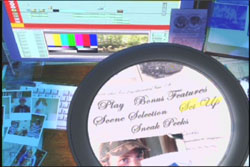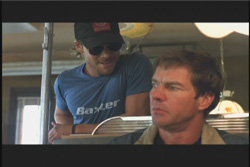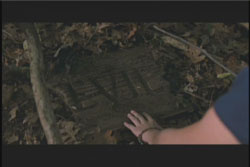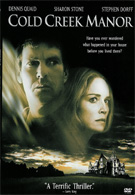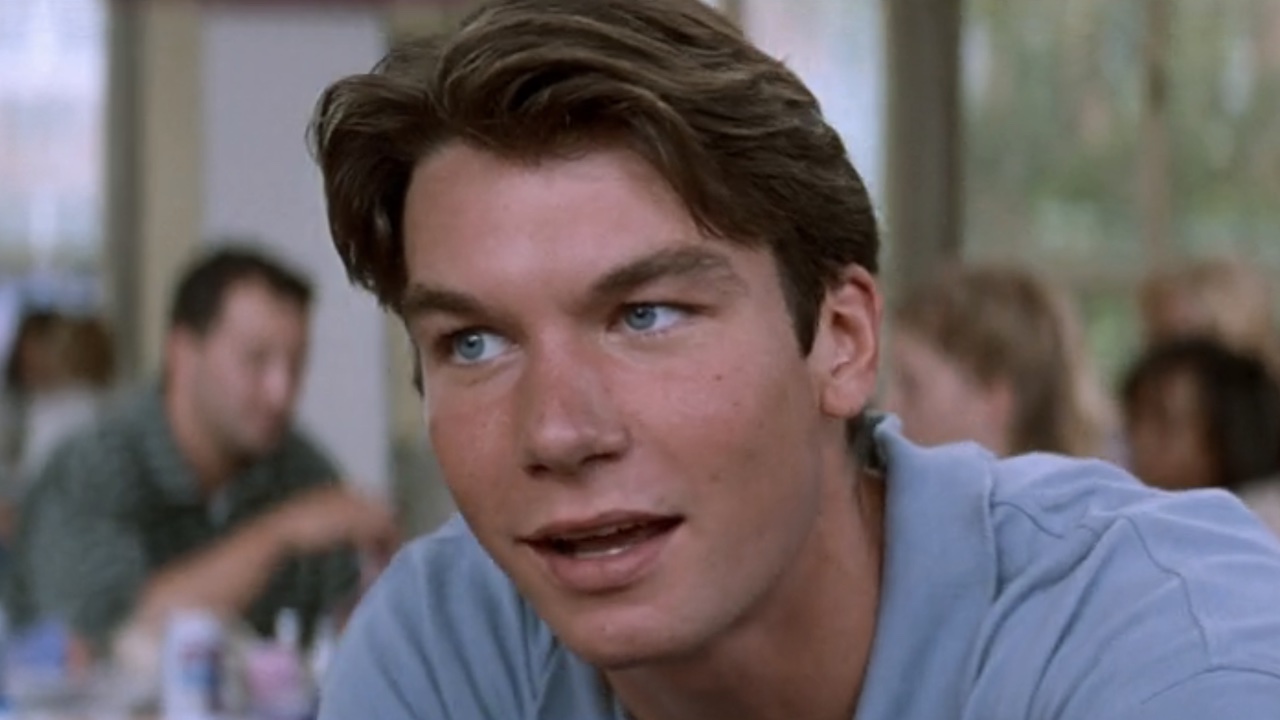“Have you ever wondered what happened in your house before you lived there?” This is the question posed by the marketing for Cold Creek Manor, a poor attempt at a “heart-pounding thriller” that instead has you wondering “Where can this film go wrong next?” It’s all Sharon Stone’s fault. If she had only reset her alarm, then Dennis Quaid would have woken up on time. He would not have been in a rush to get the kids to school, not had his son almost hit by a car, not decided to move out of the city, and not forced me to watch the two hour debacle that follows called Cold Creek Manor.
To recap for people who haven’t seen Cold Creek Manor: Dennis Quaid and Sharon Stone play Cooper and Leah Tilson, two New York parents who find themselves being swallowed up by the city and decide to take their family to a safer place. Instead of finding a safer place, they buy Cold Creek Manor, an old beaten manor that they intend to turn into their dream home. Eventually the previous owner Dale Massie (Stephen Dorff) shows up and eventually begins to terrorize the Tilson’s lives. All of this is “eventually” because the film never gives any solid idea of the passage of time. Rooms look beaten up, filled with the relics of the previous family, and then they are clean and neat and redone, while other rooms still have walls that barely hold the room together. As Cooper Tilson attempts to protect his family from Massie’s psychotic ways, he also starts to piece together the mystery of Cold Creek Manor’s past… well, actually it’s Dale Massie’s past, but Dale Massie isn’t half as interesting a title as Cold Creek Manor
The movie itself is a giant mistake in filmmaking. Bad writing lets the characters make bad decisions, hiring the former house owner (who broke in to have a look around) to fix the pool instead of asking him to leave or calling police, or worse, characters don’t pass on what easily seems to be crucial information to other characters. Musical stingers hit moments where nothing happens on screen, presumably to build tension, but instead creating an almost laughable effect. Plot points are so easily predictable it isn’t funny: Cooper’s daughter Kristin (played by Kristin Stewart) gets a horse, so something must happen to that horse and it does. We are shown a new weapon, so something must happen with that weapon and it does. Instead of following some sort of plot from point A to B to C to D, for reasons unknown we jump from A to C leaving B out of the film and leaving the audience clueless as to what some characters are talking about, or why character relationships have changed. To top it off, Dennis Quaid’s character gets drunk about halfway through the movie and Quaid himself seems to stay that way through the rest of the film. Either that or he was struck with some form of mental retardation, which is really unfair because I’ve seen movies in the thriller genre before with someone suffering from mental retardation that did much better then Quaid did in this movie. So we’ll stick with him remaining drunk, which might not have been a bad idea in order to make it through the filming. Director Mike Figgis (who in the past brought us Leaving Las Vegas and the brilliant film Timecode) really should have his camera taken away from him.
The DVD for Cold Creek Manor gets a little higher marks for having some content to it. Unfortunately most of that content is mediocre and just acts as a reminder of how poor the movie really is. There are a few deleted scenes, most of which deserved to be deleted. A few of them might have helped the movie a little more, such as in transitioning two confusing scenes and letting Dennis Quaid’s character get the upper hand for a moment. None of the good deleted scenes are worse then anything else in the movie, but they aren’t much better either.
Two featurettes are included. “Cooper’s Documentary” looked promising. I had hoped this would be a mock up of the documentary Cooper Tilson was working on inside the movie. Instead the section turns out to be Figgis talking about having to film the movie as a movie, and the documentary parts as a documentary, and the home video parts as a home video. Basically it’s a featurette that makes a big deal out of something that’s common sense and shouldn’t have taken much artistic skill to pull off.
The other featurette, “The Rules of the Game” is where Mike Figgis proves he is completely unable to work in the Thriller genre. He talks about the rules of the genre, pacing, music, editing, etc. He has a good grasp of what the rules are, which makes it all the more baffling that the film doesn’t follow any of them. The film drags at times and the audience is almost guaranteed to be ahead of the film by the end of the first act, but Figgis tells us these are no-no’s for the genre.
Finally the film has a commentary track with the director. If you were able to make it through the film once, you most likely will have no interest in watching it again with the director talking. In fact, I suggest you don’t watch it with his commentary track since he inadvertantly points out a lot of the mistakes I’ve pointed out above. Remember the abstract passing of time I mentioned before? Figgis talking during a scene transition says “Let’s say this is… a month later”. If you want to say that, why didn’t you say it in the movie? Why do I have to listen to a director’s commentary to know how much time is passing in the movie? He talks about Dale’s cigarettes, that they had intended him to be European, rolling his own cigarettes, but that preview audiences mistook his hand rolled cigs for joints (as did I) so he clarifies that they are tobacco, “just so everybody knows that”. Again, why wasn’t this clarified in the film? Who the heck expects a country hick jailbird type character to be European about his cigarettes? It just doesn’t make sense.
Your Daily Blend of Entertainment News
If you want to see a good Thriller, avoid Cold Creek Manor and go find a copy of Pacific Heights. Yeah, you might not get a good look at Stephen Dorff’s cut frame, but your brain will thank you for it in the long run.
